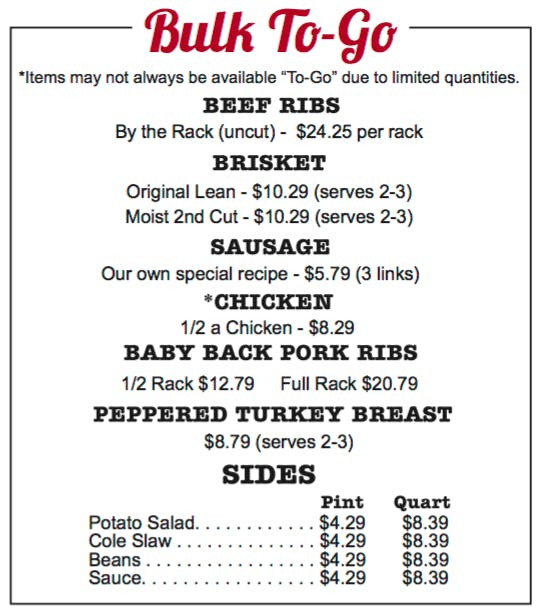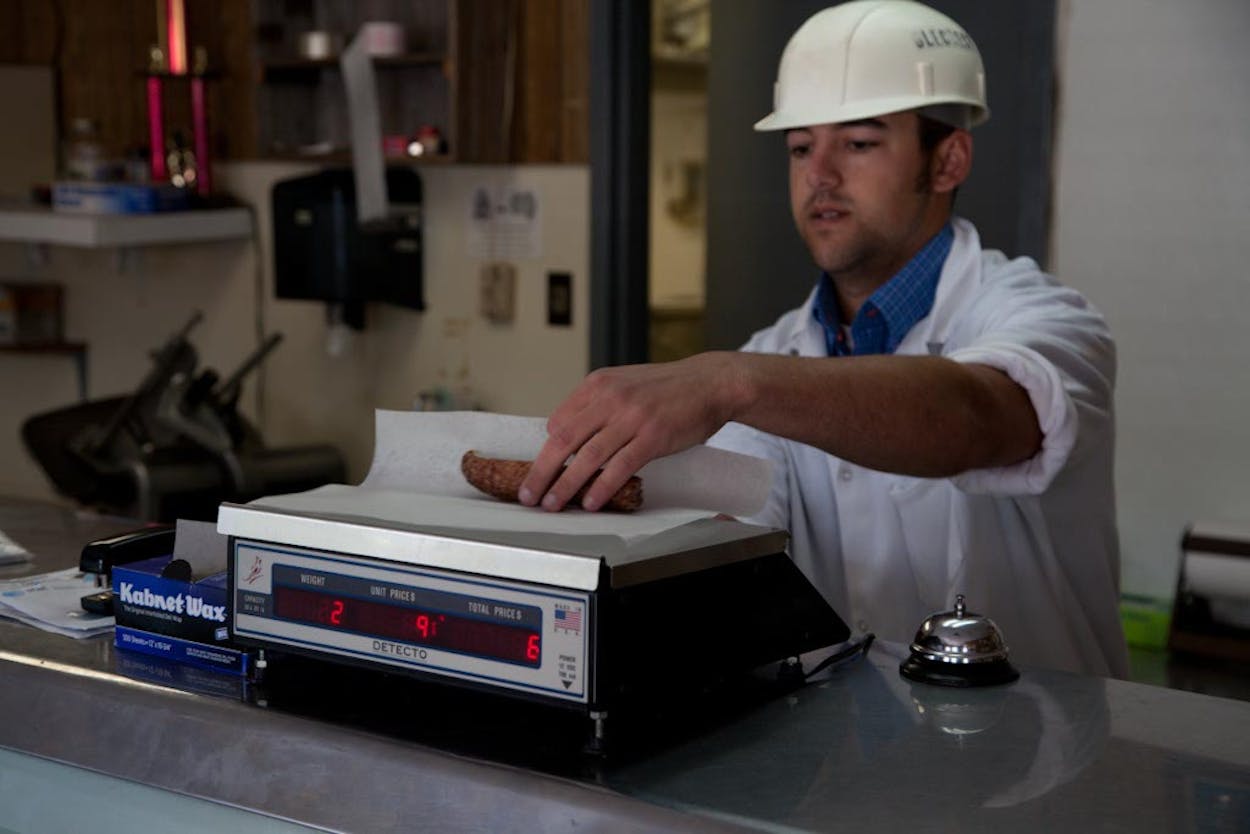Update: Mark Loeffler, communications director for the Texas Department of Agriculture*, provided more details on their enforcement effort. Operation Maverick was launched in June 2015 to target any business buying or selling goods by weight. He didn’t have current numbers, but by March 2016, they had inspected 1,400 barbecue joints. Loeffler** hopes the enforcement effort covers enough businesses, including barbecue joints, that Operation Maverick can “put itself out of business,” but inspections are ongoing.
More and more barbecue joints are selling their smoked meats by the pound. It’s both a reminder of the meat market origins of Texas barbecue and an easy way for customers to try a little of everything. But the Texas Department of Agriculture (TDA), which oversees the regulation of such scales, sees the trend as an opportunity to cover a gap in their state funding.
Nick Pencis bought Stanley’s Famous Pit Bar-B-Que in Tyler in 2008. They sell barbecue plates, sandwiches, tacos, and barbecue by the pound. He’d never seen a TDA inspector come in until last year. “He walked in showing his badge telling us they were cracking down,” Pencis said. Stanley’s scales weren’t compliant with state requirements, and they hadn’t been registered. Pencis was told he’d need to buy new scales that were denoted as “legal for trade” and the inspector specifically recommended Rusty’s Weights and Scales as the company he needed to contact to get into compliance. Pencis felt strange that a state agency would recommend a specific vendor, but he bought the proper scales and is now in the clear.
To register each scale at the restaurant with the TDA, Stanley’s pays a $35 annual fee, which is state law. It’s a requirement for scales used for all items being bought and sold by the pound, which includes butcher shop steaks, frozen yogurt, and barbecue. That’s always been the case, but many barbecue restaurants are unaware of the requirement.
The Texas Restaurant Association seems surprised at the sudden crackdown, saying in a statement that never before “has there been a direct focus on restaurants nor has TRA ever heard from its members, until now, of TDA inspectors showing up and doing spot inspections relating to scale registrations.” I spoke with Kenneth Besserman, general counsel for the TRA, who said the agency has been trying to meet with the TDA to discuss the new enforcement methods. “We would have been happy to educate our members,” he said. Besserman still hopes to find common ground with the TDA during the upcoming legislative session. The TRA even produced the video below to warn restaurants that they’re now a target.
Julian Zapata at Julian’s BBQ in Corpus Christi said he knew about the requirement, so he was in compliance when visited by a TDA inspector who came to check scale accuracy in the middle of lunch. But he was surprised when the annual fee for each of his two scales jumped from $16 to $35.
He’s not alone. Fees were raised dramatically throughout the TDA in 2015. Agriculture commissioner Sid Miller said the increase was necessary after the department’s budget was slashed by a third in 2011, a bill he voted for as a member of the Texas House of Representatives. Without the necessary funds to run the department, Miller proposed to make up the difference with fee hikes that would bring in an additional $22 million to the TDA. Skeptical lawmakers noted his target should have been closer to $5 million in revenue. Still, they agreed to give the TDA an additional $1.5 million dollars specifically for weights and measures inspections, hence the recent wave of scale inspections.

At both Sonny Bryan’s in Dallas and at Riverport Barbecue in Jefferson, inspectors came in during the lunch hour and cited the businesses for improper scales. Both businesses have purchased new scales and registered them with the state. Meanwhile, the County Line in Austin was cited for the scales not being conspicuous to the customer. Owner Skeeter Miller decided that instead of continued inspections, and a restaurant redesign to move the scales, he’d simply change the menu. Now instead of selling by the pound, they sell portions “per rack” or by the person (see menu above), so the rules about “legal for trade” scales no longer apply.
That could be a new trend if enforcement keeps up. Scales used for weighing meat that will be sold by the pound are definitely up for scrutiny, but if a restaurant is selling barbecue plates and sandwiches, then the scales can be any model they like, and aren’t required to be registered. The same goes for any scale used for portion control. Pencis had this argument at his new pizza place, Roast, in Tyler. An inspector tried to cite him for a scale they used for prep and portioning, but finally relented. “If you sell by weight, you have to have a scale that is legal for trade, and you have to have a sticker on it,” Besserman reminded barbecue owners. So get in compliance now, or revise your menu. Barbecue profit margins are slim enough—don’t waste them paying government fines.
*TMBBQ reached out to the Texas Department of Agriculture for comment before publishing the story and they contacted us yesterday.
** Loeffler, an Austin resident, enjoys Iron Works BBQ, and notes that their scales are in compliance.
- More About:
- Sid Miller








